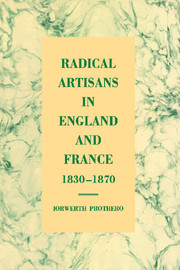Book contents
- Frontmatter
- Contents
- Acknowledgements
- List of abbreviations
- Introduction
- 1 Artisans
- 2 Radicalisms
- 3 Trade unionism
- 4 Work and radicalism
- 5 Socialism
- 6 Co-operation
- 7 Class and radicalism
- 8 Political action and organisation
- 9 Education and civilisation
- 10 Religions and philosophy
- 11 The culture of radical clubs
- Conclusion
- Notes
- Select bibliography
- Index
10 - Religions and philosophy
Published online by Cambridge University Press: 24 November 2009
- Frontmatter
- Contents
- Acknowledgements
- List of abbreviations
- Introduction
- 1 Artisans
- 2 Radicalisms
- 3 Trade unionism
- 4 Work and radicalism
- 5 Socialism
- 6 Co-operation
- 7 Class and radicalism
- 8 Political action and organisation
- 9 Education and civilisation
- 10 Religions and philosophy
- 11 The culture of radical clubs
- Conclusion
- Notes
- Select bibliography
- Index
Summary
In the later 1840s a group of radical artisan friends met weekly at the Crown Tavern, near Fleet Street in London, all of them Chartists and men of real significance in labour politics. The leading figure was Thomas Cooper, originally a shoemaker, who in the early years of the decade had been the fervent, dynamic, and fiery leader of the Chartists in Leicester. Julian Harney, an ex-sailor, had also been a notorious Chartist firebrand, and was now editor of the Northern Star, the great Chartist newspaper. James Devlin and John Skelton were both shoemakers, the latter an early member of the Working Men's Association and in the 1840s one of the leading Chartists in London. Both were active in their trade societies, and Skelton played a leading role in the establishment in the mid-1840s of a new national shoemakers' union, whose organ was for a while run by Devlin, and of the new national organisation to unite different trades all over the country, the National Association of United Trades, of which he became the first paid missionary. Thomas Shorter, a watch-case finisher, was a leader of the Finsbury Owenites, and Walter Cooper, a Scotch tailor, was in the early 1850s a leading figure in the co-operative production movement. Thomas Cooper, Harney, and Skelton were also prominent in international associations linking Chartists with the groups of foreign political refugees in London.
The group illustrates a number of the features outlined in the last chapter. The main purpose of the meetings was to hear and help Willie Thorn, the Inverury weaver-poet.
- Type
- Chapter
- Information
- Radical Artisans in England and France, 1830–1870 , pp. 246 - 280Publisher: Cambridge University PressPrint publication year: 1997

